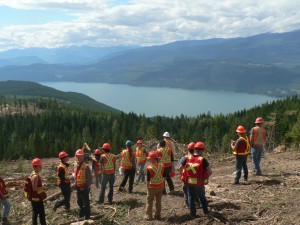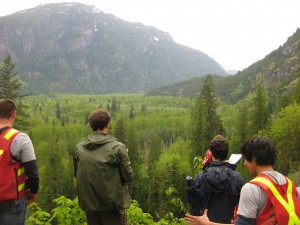FRST 558- Landscape Level Forest Land Management
Winter term Jan 3rd to April 6th, 2018
Instructors:
Lead: Ms. Deborah DeLong deborah.delong@ubc.ca
Dr. Verena Griess verena.griess@ubc.ca
Teaching Assistant:
Kathleen Coupland: kathleen.coupland@ubc.ca
COURSE OVERVIEW
Preparation of landscape-level sustainable forest management plans that integrates ecological, social and economic components.
Learning Outcomes
The student will be able to:
1) determine economic, social and environmental objectives, and management alternatives to meet these objectives;
2) identify criteria and indicators appropriate for assessing/monitoring forest management, understanding how these relate to local and global expectations;
3) gather data and where necessary, make defendable assumptions;
4) identify uncertainty and assess risk of management alternatives;
5) apply stand and forest level models for projecting outcomes and trade-off analysis;
6) work effectively within a management team on large, long term projects;
7) demonstrate an ability to meet the standards of professional practice;
8) prepare, write and defend a comprehensive forest management report; and
9) prepare and deliver professional communications orally and in writing.
Course Objectives
Students will learn the theory and practice of landscape (forest) – level decision making. Students will apply the knowledge gained from classroom instruction and readings to work in conjunction with a client to develop a sustainable forest management plan for an area of forest. Students will learn and demonstrate leadership, project management skills and professionalism as they work on this term-long project in small teams.
Course Structure
Student teams will be assigned a forest estate for which they must prepare a comprehensive sustainable forest management plan. Examples of forest estates are community forests, First Nations forest agreements, treaty or reserve lands, private forests and industrial forests. These can range in size from several hundred ha to 50,000+ ha. Student teams will meet with forest owners, managers and stakeholders to identify specific objectives and issues. They will develop several management scenarios, including appropriate criteria and indictors for assessing/monitoring them along with long term projections of key indicators. The final plan will be defended before fellow students, faculty, owners, managers and stakeholders.
During the first 6 weeks, students spend approximately 10 hours per week in lecture/discussion/labs completing modules on modelling, leadership, professional ethics, and criteria & indicators. The remainder of the course is dedicated to preparing the management plans and does not include scheduled class time. Interim products due at set dates and a final group report and defence will be presented at the end of term. As part of the Ethics module, students will prepare an individual report in which they investigate and comment upon an issue that requires professional judgement and will provide a professional opinion and a set of recommendations. Students will also give individual presentations as part of the professional ethics and modeling modules.
Grading Policies:
1. Each module must be passed in order to pass the course. If a student fails a module, s/he must take a make-up exam before the end of the spring term. No course grade will be entered into the system until all course requirements have been satisfied.
2. The forest management plan is a significant deliverable and therefore represents 35% of the course grade. The forest management plan report will be evaluated by two instructors, including the team advisor. The same grade will be awarded to each member of the team. All members of a team will normally receive the same mark for team assignments. The instructor will check periodically with each team that all team members are contributing. If necessary, each member of the team will be asked to summarize their contributions to the project and those of their team mates. Marks may be deducted from the final mark of team members who do not contribute their fair share.
3. Professional conduct, consistent with the standards of professional practice, will be evaluated using a combination of both a peer evaluation process and a joint assignment of a grade by all module instructors.
4. Grading rubrics will be distributed.
Grade Breakdown:
| Module | Report | Quiz | Defense | Other | Total |
| Modeling | 15 | 15 | |||
| Project management and communication | 15 | 15 | |||
| Professional Ethics | 15 | 15 | |||
| Forest Management Report | 35 | 15 | 50 | ||
| Professional Conduct | 5 | 5 | |||
| Grand Total | 35 | 15 | 15 | 35 | 100 |
Defenses of the 558 project reports will be after the last week of classes in Term 2. Each team will present for 20 minutes and have 10 minutes for questions. Feedback forms will be used for the defenses.
Readings will be made available under specific module tabs. Examples of forest management plans will be made available. The course will be delivered by a group of instructors, with one instructor acting as the coordinating instructor.
Admission to the program will require prior coursework in principles of biology, chemistry, physics, mathematics, introductory statistics, ecology and economics. Students must be registered in a UBC Faculty of Forestry professional Masters program to take this course, or have permission of the Program Director. Students must have completed the Fundamentals in Sustainable Forest Land Management, Land Information Acquisition and Analysis and Site-Level Forest Land Management course.


